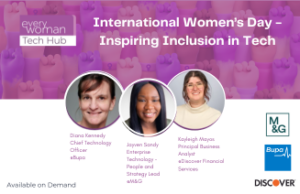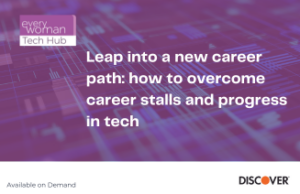The journeys into tech for Archana Santosh, Technical lead/Scrum master, Roz Turner, Cloud Product Owner and Senior Digital Designer and Developer, Lea Yurkovetskaya have been unique and diverse. Now, as leaders in the Digital and ICT teams at Imperial College London, they discuss how they use their influence to support greater inclusion, the importance of diverse role models in tech and how narrowing the gap between expectations and reality can open up clearer career pathways for women in the tech industry.
Did you always expect to work in tech and if not, what was your pathway?
Archana: I was born in India and as a child I was always inclined toward Maths. I wanted to be a teacher, not a tech leader, but in secondary school I had a glimpse of what you can do with programming language, and I was intrigued. In India, everybody went for STEM at school: if you chose anything else, there would be questions! So, there was never suggestion that girls couldn’t do tech. Growing up, we didn’t have computers at home, like the children of this generation do, so we didn’t have that easy access to technology. But I was fascinated by problem solving and how you could get boring things done programmatically, and that led in the end to me doing a Masters in Computing.
Roz: I don’t think I had any expectations of where I would work when I was growing up. I left Sixth Form halfway through and my initial career was in the energy industry, where I worked for 10 years. I saw myself staying in that field, but ended up in tech because of a niche I found myself in there that moved me naturally into a more technical role. I’ve also always been a problem solver though and some of the things I did in my last job — even basic stuff like creating macros on spreadsheets — had put me in a good mindset for a move to IT.
Lea: I started programming relatively early in high school in America, then completed a double major in Computer Science and Fine Arts. At the time that I was doing my computer science degree, it felt largely theoretical and I didn’t see a clear pathway for me in the industry. So, I switched to a Masters of Fine Art afterward, but I’d still take any opportunity to do a little coding project here and there and that’s where I stumbled upon web design and development. These helped me bring together the aspects of problem solving and the creative element of presenting information and communicating in a visual way.
What did you perceive, particularly as a woman, about working in tech? And what were the realities?
Archana: When I joined my first organisation, I was in a team of 40 people, with only three women developers. You had to be loud to be listened to and I thought that you would have to be quite assertive sometimes to make sure your ideas were taken on board — which I find is still true.
Roz: I don’t know that I had expectations, other than it would be a largely male-dominated environment. And I’ve certainly experienced situations in my tech career that I think would have been different had I not been a woman. There was an example recently at a staff meeting where HR was presenting on the gender pay gap. It was a really good conversation, until somebody chimed in to say, ‘We are favouring women, why are we doing this?’ I politely invited them to talk to me about it — that’s how I get around things like that now. I’m diplomatic but in an assertive way, and I’ve not really had the ability to do that before, so it feels empowering.
Lea: I just thought that it was going to be tough, and I was going to have to stand my ground, although I’m a naturally a relatively shy person, so it’s not in my comfort zone to speak up. The biggest challenge for me, though, is ‘imposter syndrome’. I’ve taken time out to have children, and every time I come back, I feel I’m not seen as delivering work at the same rate as the rest of the team and I have to compensate. I’m constantly battling my own demons.
How important are diverse perspectives in the tech industry and what do they bring to the table?
Archana: As leaders and as a team we need to value and appreciate the skills that everybody in a team possesses, from our different backgrounds, educational paths and experiences. We also need to be transparent in our culture and work to be aware of any bias, while sharing our knowledge freely among the team.
Roz: I think it’s important for organisations to publicly support campaigns for equality and I’m proud that Imperial does that. I believe making a statement like ‘Black Lives Matter’, for example, is not political it is a statement of fact, and I would love to see more organisations, especially in tech, hammering that sort of thing home, because these campaigns have a huge reach. Other things that could help are improving diversity training. Most diversity training is dreadful ‘typical ‘death by PowerPoint’ that is not meaningful or impactful. Organisations should be encouraging staff to set up their own networks for LGBT, neurodiverse or disability, for example, which are supported by top leadership teams. This would be a huge deal as it would send a message to everybody that you consider diversity important.
Lea: You have to show as an organisation that you value different ways of thinking, whether it’s visual thinking, algorithmic thinking or different ways of communicating the solution — because those are all part of the tech that is developed and sold. The more variety you have; the more voices you have; the better product and solution.
What do you think is needed to raise diversity and inclusion in tech?
Archana: Having a diverse team is so important, because the experience that people bring and the culture they’re from all has an impact on how they approach a problem. This then adds up to the success of the team being a productive environment that is going in the right direction.
Roz: Diversity means that people can see themselves reflected in the industry. I am in a leadership role and if my 15-year-old self could have seen someone like me — lesbian, neurodiverse, left school early — being here and successful, that would have been empowering. It’s so important that young people see themselves reflected in institutions such as Imperial.
Lea: You have to show as an organisation that you value different ways of thinking, whether it’s visual thinking, algorithmic thinking or different ways of communicating the solution — because those are all part of the tech that is developed and sold. The more variety you have; the more voices you have; the better product and solution.
Do you consider yourself a role model, and what are you trying to model for the next generation of women in tech?
Archana: I hadn’t considered myself one up to this moment! But I do try to inspire my daughter to go into tech by talking about what I do and what brings me happiness. She is interested in tech, but whether she wants to do it or not as a career is her choice. The truth is we need to have more women in tech though, especially in leadership roles. Seeing women flourishing in tech motivates others because they can see that it can be done.
Roz: I see myself more as someone quietly trying to work behind the scenes to make change happen, and part of the line of women that have supported me throughout my own career. I don’t see myself as a role model because I don’t think I’ve done enough yet, to be honest. For me, it’s more about maintaining access for women, LGBT and those who are underrepresented and trying to be part of constant change.
Lea: I actively encourage conversations. For example, we’re now in a tricky position as women I think, where we’ve gained some freedom by being granted remote work, but there’s a danger that we can all hide behind our screens and not be visible. As leaders, we need to make sure we notice when people are starting to recede into the comfort of their chair and deliberately encourage communication and the sharing of ideas.
What advice would you give to young women coming into tech?
Archana: It’s not impossible to do. If you like something and you have certain strengths, you can bring these to the table and you will find your way in tech. There are so many different types of roles that require so many different types of skills in the industry.
Roz: Don’t be put off by the skills and experience that you think are required, because you have transferable skills. So, it’s worth looking at and applying for jobs and talking to recruiters in the field. On the flip side, if you want to fast track yourself then find a role or a field that really fires you up, get the qualifications and you will find your place in it.
Lea: If you’re not uncomfortable, you’re probably not learning. That idea of ‘I don’t think I fully understand this’ and being able to conquer that fear is a really great place to be in tech because you’re constantly learning and it is constant evolving. The earlier you can get comfortable with that feeling, the better off you will be.



